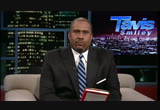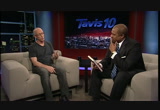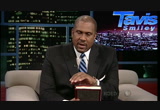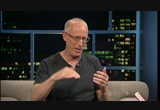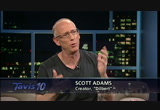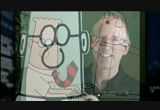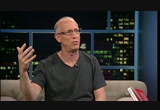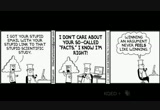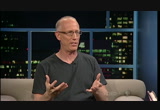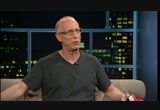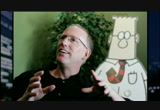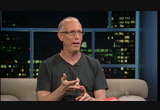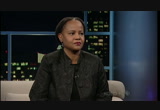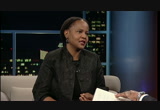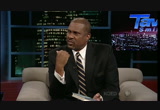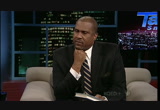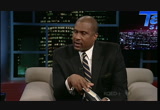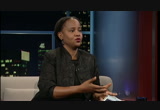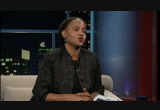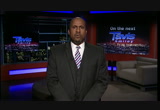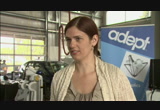tv Tavis Smiley PBS March 11, 2014 12:00am-12:31am PDT
12:00 am
tavis: good evening. from los angeles, i am tavis smiley. tonight a conversation with scott adams, the creator of "dilbert." he is also the writer of a memoir called "how to fail at almost everything and still win big." then we will turn to a conversation with acclaimed novelist edwidge danticat about her latest novel, "claire of the ," set in her native haiti. we are glad you joined us. those conversations coming up right now. ♪
12:01 am
>> and by contributions to your pbs station from viewers like you. thank you. -- tavis: is without question one of this generation's most successful syndicated comic strips, appearing in 2000 newspapers worldwide in 70 countries and 20 languages. dilbert creator scott adams says you learn more from failure than success. he has written a new book about
12:02 am
his philosophy with a wonderful title -- "how to fail at almost everything and still win big." good to have you on this program. why this book and why now? >> i noticed 80% of the world has never met a famous or successful person. mentors,people have no no role models, and even if they know somebody, they don't watch them go to work, so i thought, maybe i will just capture my experience not as advice, but i did this and got these results. most of them didn't work. i think the failures are more instructive than the successes. tavis: before i go much deeper in the conversation, give me one or two examples of what you mean by your own personal failure. >> there was my corporate career that stalled out. that became the father for the "dilbert" comics. without that "dilbert" wouldn't
12:03 am
have existed. before "dilbert" i tried to become a computer programmer. i bought this heavy portable computer for my house. i spent nights and weekends trying to write games. it turns out i am not that good of a programmer. i learned so much about computing i have used that in my corporate career and even now. all of these things become knowledge you end up using somehow. >> there are things in the book i want to talk about tonight. they are the on and interesting. they are in some ways counterintuitive. i want to give you a chance to explain. you argue that passion is bs when it comes to success. everybody says you got to have passionate for what you do, and you say that is crap. >> when
12:04 am
people get interviewed and they are famous billionaires and they ask what is the secret to success, they'll with a passion. what would be the other answers they could give? would be embarrassing. i think i am smarter than you. or i got lucky. how about, my dad was rich and he got me started. none of those answers sounded. i was passionate, and if you were more passionate you would be a billionaire, too. it followsthere but success. i was always excited in the beginning. if it works, i get real passionate. work, which is usually the case, it drains right out of me. i am out of here. tavis: if not the word passion -- i take your point.
12:05 am
there has to be some energy, some drive. >> energy. i write about taking care of your body. make sure you learn fitness and diet and those things. i'm not telling you how to do that. i am telling you you should make it a lifetime study. the people who know the most about those things get the best results to get they make the smartest choices. if your body is working your energy is high, no matter what you are doing. tavis: one of the things that might be counterintuitive to some people is you say you don't believe in goals. you believe in systems. i didn't know what you meant until i got the chance to dig into it myself. i get your point, but for those who will hear that at first glance and say, what does he got against goals? >> you can't get rid of goals. they only work if you have a system. if your goal is to lose 10 pounds, you're going to be failing until you get there, and when you are done -- when you get there, are you done? they tend to be things you do
12:06 am
and you walk away. a better system would be what i just engine. making a lifelong study of what works. find out what works for you. test things. whatever your system is, if you are thinking about rings in terms of the system, it just works out. a better example is my system for success is for my college days. i knew i would try a lot of things. most of them wouldn't work, because they are high risk. if they worked they would be a homerun. my system is if it doesn't work make sure you are smarter in the end. eventually as you layer on those skills, you become -- look at me as the perfect example. i am an average artist at best. i never took a writing class, but i can put a sentence together. i'm not the funniest guy in the room usually, but i'm funny enough. what i have is three things people generally don't. on top, and i have
12:07 am
a basket that is pretty valuable. individually, the skills are just ok. tavis: beyond skills, you talk about experiences, about how the more experiences you have, the more things you can do, the more things you can do. you talk about golf, how that has aided and abetted you in a lot of ways, even though you're not a great golfer. >> really, it's also about knowledge. the more you know, the more you can know, because everything becomes a framework for adding things. i make sure i am adding something every day. somebodyle i use it came from outer space and said, can you explain what a horses. it would take a long time because they don't have a basis for that emma but if the second question is, what is a zebra, halfway there. it's kind of like a horse, looks like one, but the coloring.
12:08 am
you are halfway there if you have got a basis. meis: take me back and give a sense of how you failed your way into "dilbert." >> when my corporate career stalled at the bank, and then i , it to the phone company started looking around, and it was part of my lifelong process of, let me try something new and see how it works, go into it far enough and see if it is going to catch on, and when i try to , the firstilbert reaction from the customers is, this thing is really poorly drawn, and i don't get it, and it doesn't have the same joke format, but what i found, unlike there washings, that a small core of people who were wild for it right from the start, and that turned out to be a good indicator that you have
12:09 am
got something worth ebeling down on. doublings -- worth down on. the things people say, that's pretty good, but it's just talking and not an indicator of anything, you want people to do something physically with their body, so if somebody says to me, i like your book, i say thank you, but it doesn't tell me the book is going to be a hit. if someone interviewed me and said, i just finished your book and there are three people i want to give it to, that's something they are doing with their body. they have to go to amazon and order it and give it to somebody. that's always a good indicator. clipping people were it out, putting it on aboard. there was one guy who put them in a book he created, and i thought, people are doing stuff with it. that's what i am going to follow. tavis: you talk about the value of having a lack of fear or .mbarrassment
12:10 am
>> i think it might be natural for me. i don't get embarrassed at the same things other people do. probably the biggest thing that holds people back is if i do this i am going to look like an idiot if it doesn't work out. you will. is, yes, people don't care. they care about themselves. it will last a second. you will move on. tomorrow you won't think about it. there's a little bit of practice on that. i took the dale carnegie course, and part of that is making people who don't beat well in front of crowds because they are nervous just do it a lot. you do it and get positive reinforcement only, and at the end, you are like, i will stand in front of 5000 people, and if it doesn't go well, that will be kind of funny. it never does go poorly because people never say that was the worst speech ever.
12:11 am
you never get that, so it's something you can practice. you can learn to harden yourself against embarrassment. tavis: i wonder if whether or not your mission with "dilbert" when you started, isn't the same mission? has it changed? whatever you were intending us to get, has it changed over the years? >> it started out just as a job. i thought, wouldn't that be great to be a cartoonist. the things i tried were things i thought, if they work they will be a great job. focus, took a business people started taking it seriously, and it did become -- i would say a cop for business in the sense that if you are too crazy and absurd in your management practices, a lot of "dilbert" comics will get left on your desk. it became a weapon iced i would
12:12 am
say, so maybe in some small way onized in iced -- weap would say, so maybe in some small way it curbed it. tavis: you argue for those that say money can't buy you happiness, they are wrong. >> they are totally wrong. i think if you talk to anybody who went from not having much to having enough to buy what they wanted, they're always happier. i get that whole $75,000 a year is some sort of magic number, but my experience is more is better up to a point. then there is a point where it doesn't make a difference. tavis: your argument is specifically money can buy you happiness because money gets you freedom, and the freedom allows you to do what you want to do when you want to do it. >> happiness is nothing but good health and freedom, and money is the single best way you can buy your freedom. if nothing else there are people who would like your money, and you can help them out, and that
12:13 am
has got to feel good, too. tavis: it somewhat counterintuitive, and that's what you promised in the title of the book, how to fail at almost everything and still win big. it's not an advice book. it's a book of information written by scott adams, the brilliant mind behind "dilbert." congratulations. good to have you on the program. award-winning edwidge danticat haiti, which about is often written through the lens of poverty and corruption. she was born in port-au-prince and raised in brooklyn. getting to the heart of this country is often at the heart of her writing, including her latest novel called "claire of the sea light."
12:14 am
i am always intoxicated and compelled when i have you on this program. it's good to have you back. >> thank you for having me. tavis: the kids are doing well? >> they are doing well, getting big. tavis: in this novel, the sea is as much a character as anybody else. >> the sea is such an important part of our history. it's how so many of us got to this part of the world. we lost so many people from the middle passage. it's something that continues with this migration to look for work. foe.ea is both friend and it's how we survive. it's also an incredible point of view from which to explore the environment and the changes made in our environment. about thel me more story. >> claire is a little girl whose mother died in childbirth, so her father is struggling with this decision, whether he should
12:15 am
keep her with him or give her to a richer woman to raise her. it's the story of that decision, which i think is sometimes underestimated the difficulty of a decision like that. it's also the story of the little town where her father the fisherman lives, the rich and poor and how they interact. tavis: you wrote part of this novel before the earthquake and the other part after. how did the earthquake as a dividing line impact or not the writing of the novel? >> i started writing the novel in 2005, and the earthquake happened in 2010. the town is based on a real town where my mother's family is from. and having seen the changes in the town all through the years even though it is a fictional town in the book, it reflects a lot of that.
12:16 am
i didn't want to write a novel about the earthquake because i not ready. i wasn't there. there are elements that would be missing that would be competing with the actual reality, so i the time keep it in right before the earthquake but have reflections about loss and environmental changes and things that have been brought about by the earthquake without having the earthquake be the center of the story. tavis: yet on page 152 there is a wonderful line i want to get to which says, how do you even choose what to mend when so much has already been destroyed? that's a powerful question. >> how do you? i think that's a question a lot of people around the world are asking themselves. whether katrina or after the earthquake in haiti or after the sunol me somewhere else -- that tsunami somewhere else. they pick up and try to continue
12:17 am
and carry on for the next generation, because in many cases you have no choice. it's a question i think that is .t the core of any disaster what do you repair? there is always something lost. mention this.t i brag that you are a macarthur genius. when they give you this high honor you can do anything you want to do, yet you have chosen andeep this story of haiti the complexity of haitian lives and the challenges, you have made that the centerpiece of your life's work today. i don't need to ask why. i know why. do you expect that will continue? is that what you are unapologetically offering?
12:18 am
>> unapologetically certainly. there is so many stories. i'm not the only one telling those stories. there are so many stories that even in my own life i feel like i could explore more deeply. an artist should never predict what you will do for the rest of your life, but so far, it's been an honor for me to have been able to tell the stories i have been able to tell because, along with other people telling them, they are not often told in the same way from this particular perspective of someone who knows both the inside and the outside, this, happy to be part of people trying to tell more complex stories about haiti. tavis: what do you hope or believe the value of doing that with novels is? >> the wonderful thing about novels is sometimes you read a
12:19 am
novel, and we know the person in the novel more than we know people in our own lives. really permitted a privilege to go deep into someone's soul. we know the experience of what it is like to be a mother through the great works of toni morrison. au can really travel with person through the novel, so i think novels show us the deepest part of people's hearts, and you cannot walk away and say, i don't know. it's another more in-depth way of looking at some of these individuality is, which is often denied to people like me because people already think they know who you are because they have seen sound bites on the news. music, literature, art, all these arts that transcend the every day can reach people in a profound way.
12:20 am
even in this new novel there is death and some destruction. i wonder if in your life you have a lot of living to do -- i wonder if you think the et --ive writ large about can change, will change, and if so, how does that happen? >> it has to change because it needs more voices. it needs more voices from within. it also needs all of these stereotypical views overturned, and how do you overturn them? by counter narratives. it's not that we have to write novels for that but to raise forces within haiti, from the haitian american experience, and also from the narrative itself, the way people are living, these
12:21 am
types of situations have to change, because often our stories are written, and when i mean written i don't mean just told, but they are decided by the outside. the cubs haiti has this history for which it's been punished of a great revolution, of great visionaries in our past, i think we are always looking towards that next step where a group of people will come and change that narrative. half the population of haiti is under 25, so i have great hope that at some point there will be a change in narrative but also this change in course. tavis: let me move from fiction to nonfiction, from the book "claire of the sea light" to what is happening in real time in haiti. as the relationship changed much ?t all in the era of obama
12:22 am
>> i think in this time we are living in now, pretty much i think haiti was delegated to the state department, and there has been -- the u.s. intervention in haiti has always been forceful one way or the other. we want you to take out your leader. it's always felt in ways that totally change. some responsewas after the earthquake, but there is some renewed interest. of the congress people have spoken out in terms of what is happening is the time for the elections have passed. now you might have a consolidation of powers at the top. you might have an administration moving by decree if you don't have these elections. headed it's always two
12:23 am
and sort of do what we want or else kind of situation. one has to be very careful when asked for the interventions. me jump to the dominican republic. there is obviously a relationship. i wasn't aware of this. i feel kind of stupid i wasn't aware of this. i know you can enlighten me. there is this intrinsic law now taking hold in the dominican republic i think the audience ought to be aware of. tell me what you think is happening in the dr. >> recently the high court in the dominican republic passed a ruling in which they considered anybody who was born there from 1929 on who did not have a dominican parent to be in transit, and usually when one is in transit in the country they are only there for 10 days or a couple days, so that means for the haitian migrants who are the
12:24 am
majority of immigrants in the dominican republic, and they are there for four generations, they will neither have haitian citizenship nor dominican citizenship. it makes it impossible to go to school, to get a job, and you could be removed at any time. dominican born haitians or even people who have been dominican longer than 1929 sometimes are picked up because they are dark skinned and it's hard to tell, and sometimes they are shipped to the border and end up on the other side. it's something i think for anybody who goes to vacation in the dominican republic who has been planning a holiday, it's worth knowing these things are happening, that you have close to a quarter of a million people who are essentially stateless by court ruling that is considered, even by the president of the country,
12:25 am
to be a reversible, so they are going to other bodies internationally to try to revert this, because you cannot essentially make four generations of people stateless in one swoop. tavis: can we point out for those of you vacationing in the dominican republic, consider your self aware. the new book is called "claire of the sea light." she is a macarthur genius and in all of -- all around good person. thanks for watching. as always, keep the faith. >> for more information on today's show, visit tavis smiley at pbs.org. tavis: hi, i'm tavis smiley. join me next time for a conversation with jim henson's biographer ryan j jones.
12:26 am
12:30 am
% >> welcome to this is us. i'm becca king reed. this weekend we are in oakland at the space and science center and our focus is on the heavens. you'll meet three remarkable astronomers the first working with nasa. the second will give us the inside scoop on the telescope. and another to show we are not alone in the universe. we have lots of great stories to share and it all starts now. ♪[ music ] >> welcome back to the space and science center. joining me now
137 Views
Uploaded by TV Archive on

 Live Music Archive
Live Music Archive Librivox Free Audio
Librivox Free Audio Metropolitan Museum
Metropolitan Museum Cleveland Museum of Art
Cleveland Museum of Art Internet Arcade
Internet Arcade Console Living Room
Console Living Room Books to Borrow
Books to Borrow Open Library
Open Library TV News
TV News Understanding 9/11
Understanding 9/11

